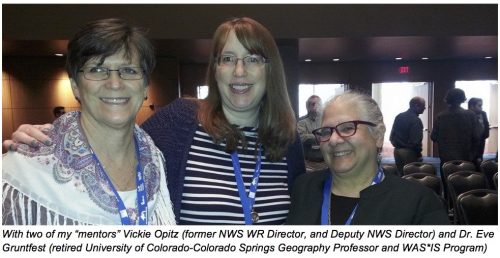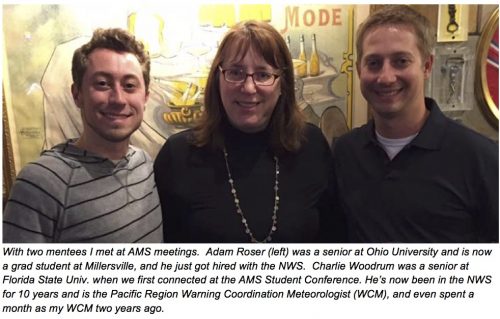by Mona Behl, Georgia Sea Grant
Guru-shishya parampara is a centuries-old tradition in India that fosters a thoughtful exchange of ideas, expertise, and friendship between a guru (teacher) and shishya (student). The relationship between a guru and a shishya is an emotional, spiritual, and intellectual friendship built on the foundation of trust, respect and commitment.
I got the opportunity to reflect on guru-shishya parampara during a panel discussion led by the AMS Board for Early Career Professionals. The session – “The Early Career Leadership Academy: Beyond Leadership to Mentorship” — aimed to reflect on the 2018 AMS Early Career Leadership Academy (ECLA), address leadership issues in the workplace and provide mentorship to students and early career individuals. Facilitated by my dear friend and colleague, Brad Johnson, the panel discussion featured Chris Vagasky from Vaisala, Kimberly Wood from Mississippi State University, and Alan Sealls from WKRG-TV. Brad, Chris, and Kim are all alumni of the inaugural class of 2018 AMS ECLA. What follows is a brief summary of what I learned from the panel discussion, and I hope it encourages you to consider applying for the 2019 AMS ECLA–the deadline is coming up fast.
Mentorship is friendship. Over time, this relationship develops organically. You may not realize the role that mentors have played in your life until several years later, when you reflect on your experiences and think about the people who have guided you, supported you, and rooted for you, all along.
Mentors come into our lives in various relationships. Some mentors are individuals who are more experienced and have more knowledge than you. Others are colleagues who may be at the same career stage as you. Parents, teachers, siblings, and even friends could all be mentors. Sometimes mentorship can be established in a structured manner. It needn’t be sought only from individuals who enjoy a high-profile career or are well established. Everybody has something valuable to offer. At any stage of your career, you are both a mentor and mentee.
Communication is the key to a good mentoring relationship. Assessing the effectiveness and impact of communication in a mentorship is equally important. An effective mentor gives wise counsel, and the mentee feels comfortable speaking on issues that may be sensitive. Shared vulnerability between two individuals nurtures trust and builds honest mentoring relationships. However, being vulnerable also means taking a risk of harm, which you need to acknowledge and understand. You also need to know when to walk away from that relationship.
Mentoring is a skill that can be developed over time through practice, participation, and partnership. Many individuals who wish to be mentors are confronted with imposter syndrome. Overcoming the imposter syndrome might entail developing a network of peers and colleagues who are able to provide validation, guidance, and support, when needed. If you feel like an imposter, chances are that others in your situation feel the same way.
It is also important to acknowledge the benefits of being a novice in mentorship and recognize opportunities presented by failure. Confronting failure and acknowledging that you don’t know everything isn’t proof that you are worthless. It is an opportunity to grow. Cultivating a mindset of learning instead of performance allows you to view your limitations as growth opportunities thereby catalyzing self-improvement. Extending opportunities to others so that they too can learn and grow builds confidence and generates greater benefits for society.
Mentorship is a doorway to complete transformation for both the guru and shishya. Done right, mentoring can benefit both: you get a chance to share your experiences, learn about challenges and opportunities that you aren’t aware of, and uncover ways of doing things differently.
ECLA is designed to be a transformative peer-to-peer mentoring experience for early career leaders in weather, water, and climate science professions. As a result of the Academy, ECLA alumni have been able to take calculated risks in their lives, connect with colleagues in similar career phases, and acquire affective skills that are usually not taught in traditional academic setting. Most importantly, ECLA participants have been able to build deep and meaningful relationships with a diverse group of peers who support and advocate for one another, lead their organizations through uncertain times, and inspire change.
Mentoring changed my life for the better and I sincerely wish that it transforms your life too. Please consider applying for the a place in the next AMS Early Leadership Academy. The application deadline is 8 March 2019; the Academy, including regular webinars, begins in April and leads to a meeting at Stone Mountain, Georgia, on 24-26 July. From there, the program continues onward with guru-shishya parampara.
mentoring
Mentoring365 and You!
by Tanja Fransen, AMS Councilor and Mentoring Program Ad-Hoc Committee Chair
AMS has a wealth of talent and we’d love to see more of our members signed up for the Mentoring 365 program as mentees, mentors–maybe both! We should never stop learning. When I started in college and early in my career, I hadn’t even heard of the term mentor, let alone thought of myself as a mentee. Looking back now, there are so many people who I can count as someone who had a positive influence in my decisions and the path my career took. Coaches, mentors, professors, classmates, co-workers, bosses, supervisors, leaders: they all had a hand in shaping my career because they invested their time in me. Who are you investing your time in? Who is investing their time in you?

About ten years ago, through various leadership programs, I learned more about formal mentoring, and I couldn’t help but wonder, “Why doesn’t everyone have a mentor?” It’s a logical step for anyone who is excited about their careers and looking for guidance. Everyone can benefit from having a non-coworker or non-supervisor to talk with, who will be honest with them, encourage them, celebrate their successes, and help them get to the next levels in their careers. I’ve participated in several formalized programs, and it always puts a smile on my face to see these mentees doing well. One of the most amazing moments for me was having a mentee whose son was murdered while we were working together. We went from my mentoring someone in sciences and government, to learning one of the most amazing lessons about grace and forgiveness, and I’ll never forget that experience. Not all benefits are apparent when you start a program!
When I was nominated to run for the council of the AMS, it was an obvious niche that was needed. I made it one of my priorities to bring a formal program to all of our AMS members. With the help of others within AMS who also had our people as their passion, including Matt Parker, Keith Seitter, Wendy Marie Thomas, Wendy Abshire, Maureen McCann, and Donna Charlevoix, we were able to connect AMS with the American Geophysical Union’s (AGU) Mentoring365 program through a signed MOU. AMS members can join this program as either a mentee, a mentor or both. You also have access to mentors across the geophysical sciences, including members of the AGU, the Society of Exploration Geophysicists (SEG), Association for Women Geoscientists (AWG), and the Incorporated Research Institutions for Seismology (IRIS).
I’ve met the most amazing people thanks to AMS, from the enthusiastic students, to the eager early career professionals to the mid- and late-career professionals who have the most amazing resumes and curricula vitae! Let’s tap into all of that energy out there and build Mentoring 365 for the benefit of all! Join today!
